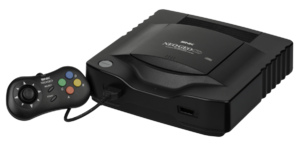Engineering:Neo Geo CD
 | |
 The top loading Neo Geo CD system with controller | |
| Manufacturer | SNK |
|---|---|
| Type | Home video game console |
| Generation | Fourth generation |
| Release date | |
| Introductory price | |
| Discontinued | 1997 |
| Media | CD-ROM |
| CPU | Motorola 68000 @ 12 MHz |
| Predecessor | Neo Geo AES |
The Neo Geo CD[lower-alpha 1] is the second home video game console of SNK Corporation's Neo Geo family, released on September 9, 1994, four years after its cartridge-based equivalent. This is the same platform, converted to the cheaper CD format retailing at $49 to $79 per title, compared to the $300 cartridges.[1] The system was originally priced at US$399,[2] or £399 in the UK. The system can also play Audio CDs. All three versions of the system have no region-lock. The Neo Geo CD was launched bundled with a control pad instead of a joystick like the AES version. However, the original AES joystick can be used with all three Neo Geo CD models.
As of March 1997, there had been 570,000 Neo Geo CD units sold worldwide.[3]
History
The Neo Geo CD was first unveiled at the 1994 Tokyo Toy Show.[4] The console uses the same CPU set-up as the arcade and cartridge-based Neo Geo systems, facilitating conversions. SNK planned to release Neo Geo CD versions of every Neo Geo game still in the arcades.[5]
Three versions of the Neo Geo CD were released:
- A front-loading version, only distributed in Japan, with 25,000 total units built.
- A top-loading version, marketed worldwide, as the most common model.
- The Neo Geo CDZ, an upgraded, faster-loading version, released in Japan only.
The front-loading version is the original console design, with the top-loading version having been developed shortly before the Neo Geo CD launch as a scaled-down, cheaper alternative model.[6] The CDZ was released on December 29, 1995[7][8] as the Japanese market replacement for SNK's previous efforts (the "front loader" and the "top loader"). The Neo Geo CD had met with limited success due to it being plagued with slow loading times that could vary from 30 to 60 seconds between loads, depending on the game.
In response to criticism of the Neo Geo CD's long load times, SNK planned to produce a model with a double speed CD-ROM drive for North America, compared to the single speed drive of the Japanese and European models.[1] However, the system missed its planned North American launch date of October 1995, and while SNK declined to give a specific reason for the delay,[9] in their announcement of the new January 1996 launch date they stated that they had decided against using a double speed drive.[10] Their Japanese division had produced an excess number of single speed units and found that modifying these units to double speed was more expensive than they had initially thought, so SNK opted to sell them as they were, postponing production of a double speed model until they had sold off the stock of single speed units.[11]
The CDZ was only officially sold in Japan during its production. However, its faster loading times, lack of a "region lock", and the fact that it could play older CD software, made it a popular import item for enthusiasts in both Europe and North America.[citation needed] The system's technical specs are identical to the previous models except that it includes a double-speed CD-ROM drive.[12][13]
In response to reader inquiries about Neo Geo CD software, GamePro reported in an issue cover dated May 1997 that SNK had quietly discontinued the console by this time.[14]
Reception
Criticism of the system's generally long loading times began even before launch; a report in Electronic Gaming Monthly on the Neo Geo CD's unveiling noted, "At the show, they were showing a demo of Fatal Fury 2. The prototype of the machine that they showed was single speed, and the load time was 14-28 seconds between rounds. You can see that the screen[shot] on the right is a load screen."[4]
Approximately one month after launch, SNK reported that they had sold the Neo Geo CD's entire initial shipment of 50,000 units.[15]
Reviewing the Neo Geo CD in late 1995, Next Generation noted SNK's reputation for fun games but argued that their failure to upgrade the Neo Geo system with 3D capabilities would keep them from producing any truly "cutting edge" games, and limit the console to the same small cult following as the Neo Geo AES system although with less expensive games. They gave it 1 1/2 out of 5 stars.[16]
Technical specifications
- Main Processor: Motorola 68000 running at 12 MHz
- Coprocessor: Zilog Z80 running at 4 MHz
- Colors On Screen: 4,096
- Colors Available: 65,536
- Resolution: 304 x 224
- Max Sprites: 384
- Max Sprite Size: 16 x 512
- Number of Planes: 3 (128 sprites per plane as the Neo Geo does not use bitmaps for its planes like with most game systems at the time)
The system is also capable of reading Redbook standard compact disc audio.
In addition to the multi-AV port (nearly identical to the one used on the Sega Genesis model 1, though they are not interchangeable), all Neo Geo CD models had composite RCA A/V and S-Video out jacks on the rear of the console.
The CD system's 56 Mbit / 7 MB of RAM[1] was split accordingly:
- 68000 Program Memory: 2 MB
- Fix Layer Memory: 128 KB
- Graphics Memory: 4 MB
- Sound Sample Memory: 1 MB
- Z80 Program Memory: 64 kB
- VRAM: 512Kb[5] (For graphics attributes)
- SRAM: 2 KB (For high scores / general save data)
Game library
While the Neo Geo CD library consists primarily of ports of MVS and AES titles, there are a few MVS arcade games which were not officially released for the Neo Geo AES and ported instead to the Neo Geo CD. These include Puzzle Bobble, Janshin Densetsu: Quest of Jongmaster (a Mahjong game also released for the PC Engine), Power Spikes II, Neo Drift Out: New Technology, and Pleasure Goal (Futsal: 5-on-5 Mini Soccer).
A few games which were unreleased in MVS and AES formats were also released exclusively for the Neo Geo CD. These include Ironclad: Tesshō Rusha (Chōtetsu Burikingā, BRIKIN'GER), Crossed Swords II, ZinTrick (Oshidashi Zintorikku), ADK World, Neo Geo CD Special, The King of Fighters '96 Neo Collection, Samurai Shodown RPG (Shinsetsu Samurai Spirits: Bushidō Retsuden; an RPG spin-off of the Samurai Shodown series that was also released for the Sony PlayStation and Sega Saturn), and Idol-Mahjong Final Romance 2 (an arcade game which is not an MVS game, but was ported directly to the Neo Geo CD).
Prototype games
- Bang² Busters [Bang Bang Busters] (Made by Visco in 2000. Released in 2010 for Neo Geo CD by N.C.I.);
- Treasure of the Caribbean [Caribe no Zaihō] (Made by Face in 1994. Released in 2011 for Neo Geo CD by N.C.I./Le Cortex).
Notes
References
- ↑ 1.0 1.1 1.2 "Neo Geo CD: The New Kid in Town". GamePro (IDG) (85): 30. October 1995.
- ↑ "Neo Geo CD to Debut in October". GamePro (IDG) (84): 138. September 1995.
- ↑ Consoles +, issue 73
- ↑ 4.0 4.1 "Neo Geo CD Brings Arcade Home". Electronic Gaming Monthly (Sendai Publishing) (61): 60. August 1994.
- ↑ 5.0 5.1 "The Neo Geo CD: An Arcade in Your Home". GamePro (IDG) (79): 16. April 1995.
- ↑ "SNK CD for Spring". Electronic Gaming Monthly (Sendai Publishing) (63): 62. October 1994.
- ↑ "Neo Geo CD World" (in fr). http://www.neogeocdworld.info/html/fiche/fichetechniqueneogeo.htm.
- ↑ http://www.obsolete-tears.com/snk-neogeo-cd-machine-226.html (in French)
- ↑ "Neo-Geo CD Delayed". GamePro (IDG) (88): 22. January 1996.
- ↑ "Neo Geo CD Back on Track". GamePro (IDG) (89): 16. February 1996.
- ↑ "Neo CD to Be Single Speed". Electronic Gaming Monthly (Sendai Publishing) (79): 20. February 1996.
- ↑ "SNK Brings Out New Neo CDX". Electronic Gaming Monthly (Sendai Publishing) (80): 16–17. March 1996.
- ↑ "Neo Geo Short Stories". Maximum: The Video Game Magazine (Emap International Limited) (3): 117. January 1996.
- ↑ "Survival of the Coolest". GamePro (IDG) (104): 16. May 1997.
- ↑ "Gaming Gossip". Electronic Gaming Monthly (Ziff Davis) (65): 56. December 1994.
- ↑ "Which Game System is the Best!?". Next Generation (Imagine Media) (12): 75. December 1995.
 |





